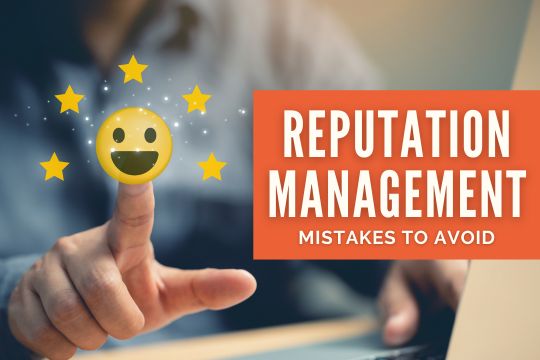

Your brand's reputation is just as important as the products you sell. If you have great products but a poor reputation, people will dismiss your business without giving you a chance. Likewise, a stellar reputation will help your brand weather the occasional controversy or economic downturn.
Social media offers a world of marketing opportunities but also makes it easy for disgruntled customers to voice their displeasure. In a world where rumors can ruin a brand in a matter of hours, these reputation management tips for businesses are more essential than ever. Once you know what to avoid, you'll add polish to your brand management strategy.

Reputation management is the art of maintaining a clean, fun and accessible brand image. You want to avoid controversy and bad press, encourage positive word-of-mouth, earn five-star reviews, and make customers feel good about buying your products.
While this sounds easy enough, most brands run into trouble eventually. You might think you've prepared for every possibility, but controversies catch businesses off guard. For example, Pepsi presumably thought their 2017 ad about a supermodel joining a protest would make waves with younger generations, but the tone-deaf concept led to heavy online backlash.
Other common issues include:
Sometimes, you'll make it out of a controversy with a few one-star reviews and a slight dent in your brand image. However, if the incident goes viral, you might have to deal with a targeted online campaign that drains your resources, overwhelms your employees, and threatens to force you out of business.
Major backlash could lead to the following:
With a good PR team, you could navigate the outrage and eventually bounce back. However, reputation management tips for businesses may keep you out of this situation in the first place. Instead of cleaning up messes, you'll focus on generating more profits.

Reputation management helps you maintain a clean image. While you can't prevent every bad review, you'll earn so many positive reviews that they drown out the negativity. You'll run social media profiles encouraging positive discussions, and news coverage focusing on press releases instead of controversies.
As a result, you'll earn more customers and watch your follower count steadily increase. Satisfied clients will tell their friends about your business, increasing conversions. Your marketing campaigns strengthen your brand's integrity and introduce your business to a new audience. When you go viral, it's because you offered excellent service or created a hilarious video.
However, online brand management requires a lot of effort. You'll need to monitor your reviews, emails, and social media profiles, look for press about your business, and check Twitter/X, Facebook, Instagram, and other platforms to see what people are saying about you. It's also important to seek customer feedback and quickly respond to complaints.
If bad press arises, you might be able to bury the article by enhancing your website and sharing optimized content that boosts your search engine ranking. Sometimes, you could even take legal action and delete the article. Otherwise, a negative article could outrank your site, souring your reputation.
You'll also need a dedicated social media team that shares fun, educational, and uplifting content on a strict schedule, shares discussion questions, hosts live streams, and responds to comments to foster discussion. This gives your brand a reputation as a community leader, not just another corporation that wants to sell its products.
Ultimately, these reputation management tips for businesses could mean the difference between floating over controversies and shutting your doors because you couldn't withstand the backlash. Now that you've learned what to do, it's time to research practices that you should avoid.

Customer feedback isn't limited to letters and phone calls anymore. Review sites and comment sections allow anyone to share their grievances with the world, damaging your reputation with a lengthy complaint or one-star rating. If a customer is particularly irate, they might put your company on blast with a social media post.
Unfortunately, negative comments are inevitable. You could test your product, service, or system a thousand times, but you'll always have one customer who experiences a flaw or mishap. You'll also get unreasonable people who arrive with impossibly high expectations or decide to take their anger out on you.
Sometimes, it's tempting to ignore these comments, especially if the customer was rude. If you have dozens of positive reviews, does one complaint matter? However, when you don't respond to comments, you show your audience you don't care about feedback. This makes people less likely to leave positive reviews because they'll assume you won't read them anyway.
Responding to a complaint could also turn the situation around. Once you've acknowledged their frustration and discussed the issue, you could make it up to them with an apology, an exchange, or a free discount. This could restore your brand's reputation in their eyes--and even if it doesn't, other visitors will appreciate your response to feedback.
You've probably seen businesses go online by "clapping back" at rude reviews. This could give your business a viral moment, but you'll earn a reputation as a snarky, edgy business that doesn't care what people think. That strategy could work for bars or tattoo parlors, but might drive people away from more professional establishments.
In any case, four- and five-star reviews are just as valuable as criticism. Thank reviewers for their comments and invite them to come back soon. They'll feel good about themselves and associate those feelings with your company.
Your social media profiles provide another channel for people to air their complaints. This might not be ideal for you, but it's going to happen, so make sure your social media team monitors your profiles and responds to all comments, both positive and negative. If you don't want to discuss issues in public, invite people to contact your customer service email address.
For more reviews from customers, send them an email or text message with a link to a short survey after they purchase. Including a gift at the end, such as a discount code or giveaway entry, makes people more likely to share their thoughts. You'll earn valuable insights into your business's strengths and weaknesses, and your clients will appreciate the chance to share their honest opinions.

Customers expect businesses to use marketing techniques to sell their products. You'll have satisfied clients if you're honest about your products' strengths and don't outright deny their flaws. However, if you stretch the truth too much, you could have a media firestorm that drives people away from your company.
In these environmentally conscious times, companies often use terms like "eco-friendly," "organic," and "sustainable" to market their goods. However, do you understand what these terms mean? If you're making claims about your business's environmental impact, you must back them up with factual evidence. Otherwise, you're looking at a possible scandal, especially if your company produces excess waste.
Minimizing design flaws can also lead to controversies. In 2019, Boeing had to pay $2.5 billion after safety issues resulted in two fatal plane crashes. Nobody expects you to outline your products' drawbacks, but if you know you have a problem, take action instead of hiding the truth. Pulling items from shelves is much easier than dealing with massive lawsuits.
Similarly, you'll need a clear, transparent website that breezes through shopping. Misleading sales, obscured prices, outrageous claims, and a lack of product information will leave people skeptical. If they do some digging and catch your website in a lie, they'll tell their friends to avoid your company.
Sometimes, transparency requires being upfront about complex topics, such as raising prices or switching suppliers. You might have to deal with some negative feedback. Still, it's better to catch flak for being honest than scandalize your customers with a lie.
Remember the Pepsi commercial from earlier? Sometimes, taking a political stance seems like a great way to please your demographic and showcase your commitment to your values. However, if your team misjudges the situation, you could alienate your audience, lose a huge chunk of sales, and become an example of infamously bad marketing.
Worse still, taking a political stance could lead to hypocrisy accusations. If a business claims to stand with unions while secretly violating labor laws, a single expose could destroy the company's image. Breaking the law is already a bad idea, but combining that with fake activism is a surefire way to grab the media's attention.
Plus, you risk angering people on the other side of the issue. They might not make up your core demographic, but they're a bigger part of your audience than you think, and losing their sales could force you to tighten your budget. In a worst-case scenario, you could become the target of an online harassment campaign.
For these reasons, many businesses decline to talk about politics. They talk about helping and uplifting others without discussing specific people, groups, causes or political parties. This creates a safe space for customers who want to talk about their lives without political debates. You won't have to worry about angering either side with an opinionated remark.
However, in today's world, many consumers believe that companies have a responsibility to speak out on social issues. Staying silent may lead to accusations that you don't care about injustice. This backlash is usually smaller than outrage over political beliefs--after all, most reporters won't write articles about statements you didn't make--but you'll have to decide if you're willing to take the risk.
Supporting local charities is often an effective middle ground. Most people agree that it's good to help disadvantaged communities, and you won't have to endorse a specific issue or political candidate. Matching customers' donations, hosting charity drives, and taking part in local events, such as giving blood or building homeless shelters, shows your audience that you truly care.
If you choose to speak about politics, hire an experienced PR firm to help craft clear, concise statements with little room for bad-faith interpretations. PR experts also help you approach social issues with knowledge and sensitivity. They may research your demographic, learn about the issues that matter to them, and develop an engaging strategy instead of dismissive or condescending.
When you're discussing issues that relate to a particular group, make sure you talk to people within that group before making a statement. They may offer suggestions and point out microaggressions that you would've otherwise missed. As a small business, you wouldn't expect global corporations to understand your needs without speaking to you first. That goes for every demographic.
Similarly, keep an eye on your political donations. You might not publicize them, but political contributions are often public record. Your business might face backlash if you donate to a divisive cause, especially if this appears to contradict your public statements.

If you're not keeping track of your profiles, the Internet might damage your reputation without your knowledge. Some platforms, such as Google and Yelp, auto-populate business information with data pulled from online sources. When this information is outdated, you might confuse and frustrate customers with incorrect hours or an old phone number on your Google Maps page.
A low social media presence also makes it difficult to manage your reputation. You can't respond to feedback, address controversies, or share high-quality content that could bury negative press. Some business owners even sign up to find that another person has already taken their name, forcing them to choose a different handle.
Likewise, neglecting your existing accounts could damage your image. If you run a few social media profiles but haven't updated in weeks, people might assume that you've gone out of business. Forgetting to change information, such as updating your address when you switch locations, makes your company look unprofessional.
Fortunately, you can quickly resolve this issue by claiming your business profiles on Google, Yelp, TripAdvisor, and similar sites. Once you've registered your business, you have full control over the information that you share. Start by filling out the contact information, then add photos, descriptions, hours, and other essentials. Customers can still leave reviews, but they'll be more impressed when they find a clean, professional page instead of a jumble of auto-populated data.
If you haven't already, sign up for a few social media platforms that target your demographic. You don't have to overexert yourself by signing up for every website; instead, focus on creating content for three or four profiles. Use consistent branding on every platform to strengthen brand recognition and let visitors know they've found the right place.
When you've established your online presence, you can start tracking reviews, replying to comments, monitoring your reputation, and building a following with a steady stream of great content. You could even create communities that encourage people to make friends, ask questions, make smart decisions, and find new ways to use your products.
Now that you've claimed your business profiles, optimized your website, set up your social media accounts, and started replying to reviews, you might feel like you've perfected your strategy. In truth, refining your strategy never ends. Your reputation management techniques could work today, but you might be looking at a different cultural landscape in a few months.
Major corporations, such as Kmart, Blockbuster, and Borders, have gone out of business because they couldn't adapt to changes. As a result, they earned a reputation for being stuck in the past. With people turning to newer, trendier competitors, these companies floundered and eventually went bankrupt.

To stay relevant, look out for cultural and technological shifts. Plenty of trends have fizzled out, so you don't have to jump on everything right away, but stay on top of changes with staying power. For example, if you prefer older social media platforms over TikTok, you could miss your chance to reach a whole new audience and manage your reputation on a site with billions of users.
However, this doesn't mean you should latch onto every hashtag or TikTok trend. Consumers roll their eyes at businesses that try too hard to be "hip." By the time you've completed your post, the moment might have passed anyway.
Instead, it's important to find the balance between trendy and timeless. A strong reputation shows clients that cultural shifts won't discourage you, but you understand modern generations and cater to their needs.
E-Marketing Associates' all-in-one reputation management software suite displays everything you need in one convenient dashboard. You'll track and respond to reviews from many sites, including Yelp, Facebook, Google, and TripAdvisor, and place the best reviews to impress new visitors.
With our software, you can send review requests whenever a customer makes a purchase, review your reputation with AI-powered analytics, and compare your brand to your competitors. This makes it easy to evaluate your strategy, find your strengths and weaknesses, and target more customers than ever before.
To get started, schedule a 15-minute discovery call. We'll discuss your business's needs and devise a plan to improve your reputation. When you're ready, you'll have access to our effective reputation management software. We also provide web design, search engine optimization (SEO), social media management, and software for social marketing, ADA compliance, and centralized messaging.
Online reputation management is the ongoing process of tracking, influencing, and improving how customers and search engines perceive your brand, mainly through responding to reviews, managing social media, and publishing truthful, engaging content.
Silence can suggest you don't care, letting single complaints dominate the conversation. Unanswered issues may snowball into viral backlash, lost sales, and lower star ratings, while quick, polite responses often turn critics into advocates.
Political messages can alienate segments of your audience, spark accusations of hypocrisy, or trigger organized boycotts. Unless carefully researched and communicated, the statement could overshadow your products and strain resources needed to handle the controversy.
Review key listings and social media at least monthly, and immediately after any change in hours, location, products, or policies. Regular checks ensure accurate contact details, fresh content, and quick replies, preventing confusion and the impression that you've closed.
Yes. Reputation management platforms aggregate comments from Google, Yelp, Facebook, TripAdvisor and more into one dashboard, send automated review requests, provide analytics, and benchmark you against competitors, saving time while helping you respond promptly and spot trends early.